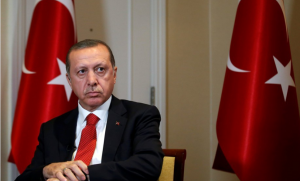Secretary of Defense James Mattis has a difficult task ahead. In a visit to Turkey Wednesday, he will step into the thicket of competing interests that characterizes one of America’s most important military partnerships. At the center of the difficulty is American efforts in Syria, which rely fundamentally on a collection of local forces among whom are actors Turkey considers terrorists.
The Trump administration has pledged to “destroy” the Islamic State. Its plan depends on: The Syrian Democratic Forces (SDF), the largely Kurdish militias fighting ISIS; airpower; and hundreds of special operations forces embedded with SDF elements to direct the battle. For Turkey, the problem is with this bloc’s most important militia, the Kurdish Peoples’ Protection Unit (YPG), the Syria affiliate of the Kurdistan Workers’ Party (PKK), which has waged an on-again off-again insurgency in Turkey for close to four decades. Turkish officials have thus threatened to target the SDF at different points over the past two years.
The United States has expended considerable diplomatic capital to keep its military out of Syria, and to prevent the decades old Washington-Ankara alliance from imploding. As a result, the U.S.-Turkish relationship has not completely deteriorated, but Ankara did choose to send troops across its border with Syria in August 2016 both to combat ISIS and contain the SDF.
Mattis does appear to be sincere in his efforts to turn the page with his counterparts in Turkey. But his efforts will seem futile unless President Trump pushes for a greater American military footprint in eastern Syria to offset the loss of SDF forces. This approach is anathema to the president’s own statements during the campaign and is out of step with current U.S. military thinking about the conflict and the ability to defeat ISIS through a heavy reliance on local militias. Thus, the U.S.-SDF partnership is likely to endure, so long as the United States remains at war with ISIS—meaning that tensions with Turkey will also endure.
Turkey’s tensions with its NATO allies have increased considerably since the failed July 15 coup attempt. Erdogan has stoked these tensions for domestic populist gains, with elements of the media loyal to his Justice and Development Party (AKP) spreading a false narrative of Western support for the overthrow and decapitation of his government. Turkish populism has moved in parallel to the rise in influence of far-right nationalism in certain Western democracies, yielding a symbiotic relationship between the AKP and the far right: They both use fear of “the other” to shape political rhetoric during campaigns. The difference in Turkey is that the rule of law has deteriorated since the failed coup attempt.
Yet, despite the tensions, key elements of the U.S. government are intent on improving relations with Turkey. The arguments in favor of strengthened cooperation rest on the longer-term threat to U.S. security in Europe and the importance of maintaining order in the transatlantic alliance. Trump has challenged the fundamentals of these key assumptions with his repeated criticism of NATO, but aside from him and a few of his current and former advisers, most contend that his campaign slogan of “America first” doesn’t mean “America alone,” or a U.S. without allies.
To engage Turkey, the United States is trying to walk a fine line. In the short term, it has indicated that it will increase intelligence cooperation with Turkey to help target the PKK. This arrangement predates the war against ISIS and the U.S. partnership with the SDF. The key problem now is that any effort to help with Turkish strikes on the PKK or the group’s leaders could undermine the U.S. war plan in Syria.
The United States already provides Turkey with targeting assistance and help tracking PKK finances in Europe. An expansion into targeting assistance, however, would create a perfect catch-22. Any such agreement would have to be kept quiet, owing to the very nature of these types of programs, in addition to the potential risk to the U.S. war effort in Syria. A secret program could win a private thank you from the Turkish government, but would do little to gain leverage over Turkey to deliver on American demands of Ankara.
These demands—the toning down of anti-American rhetoric, the cessation of AKP-led insinuations of U.S. involvement in the failed July coup attempt, the easing of tensions with the Europeans, and a serious road map back to Turkish-PKK peace negotiations—could fall by the wayside, as Ankara simply pockets the offer of assistance and continues to act in public as nothing has changed. This type of program would also be held hostage to future leaks, the outcome of which could risk the partnership with the SDF, and upend the current fight against ISIS in Syria.
The Turkish government has adopted a transactional relationship with the United States and its Western allies. The United States might as well get more comfortable dealing with Turkey in much the same way, and ask for specific things in return for American offers of more assistance.
The war against ISIS will eventually end. The strategic merits of keeping Turkey inside the tent far outweigh the benefits of trying to replace Ankara with the SDF. Increased intelligence-sharing makes sense, so long as it’s nested in a broader approach that includes Turkish deliverables. The recent period of tension, ironically, has demonstrated just how far each side can push the other without the relationship ending.
Ask me anything
Explore related questions





